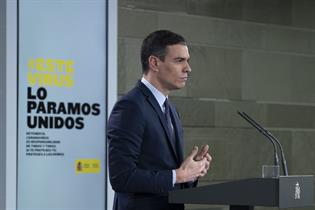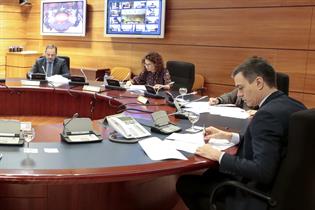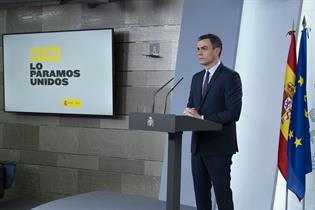Council of Ministers. Coronavirus COVID-19.
Government to mobilise up to 200 billion euros, almost 20% of GDP, to address economic and social impact of coronavirus
Council of Ministers - 2020.3.17
Moncloa Palace, Madrid
The Council of Ministers approved a Royal Decree-Law of extraordinary urgent measures to cushion the economic and social impact of COVID-19. This new legislation strengthens the initiatives implemented under the plan of exceptional measures agreed last Thursday.
The President of the Government announced that the government will free up 200 billion euros, close to 20% of the country's Gross Domestic Product (GDP), to tackle the consequences of coronavirus. 117 billion euros will be wholly public funding and the remainder will be completed by freeing up private resources.
Pedro Sánchez stressed that this is the largest mobilisation of economic resources in the history of the democracy. "This is a huge and decisive effort that responds to the magnitude of the social and economic challenge we are facing and of the government's commitment to its citizens. We will not spare any efforts. We will not leave anyone behind". The measures announced by the President of the Government are focused on four priority areas: families, workers, companies and research.
Aid for most vulnerable families
 Pool Moncloa/Borja Puig de la BellacasaThe President of the Government announced that the government will allocate 600 million euros to financing basic social services provisions by regional governments and local authorities, with particular attention to caring for the elderly and those in long-term care at home.
Pool Moncloa/Borja Puig de la BellacasaThe President of the Government announced that the government will allocate 600 million euros to financing basic social services provisions by regional governments and local authorities, with particular attention to caring for the elderly and those in long-term care at home.
In addition, protection will be extended for energy and water supplies, and telecommunications services will be guaranteed.
In order to guarantee the right to a dwelling, a moratorium is established on the payment of mortgage quotas for debtors in a situation of particular vulnerability. "No-one in a tough economic situation will lose their home. In this crisis, no-one will be evicted from their home".
Protection for jobs
According to the President of the Government, the raft of measures designed to strengthen job protection, provides for salaried workers to adapt or reduce their working day to attend to needs for work/life balance derived from this crisis. Working from home is also established as a flexibility measure when circumstances so permit.
Temporary adjustments to the workforce will be managed through Temporary Job Regulation Programmes (Spanish acronym: ERTES), which will benefit all workers. "The ERTES caused by the coronavirus crisis will be considered as caused by force majeure and, furthermore, workers will be entitled to a contributory unemployment benefit even though they do not meet the previously established contribution requirements", explained Pedro Sánchez.
The self-employed will also find it easier to cease their economic activity, which will be made compatible with an exemption from making National Insurance contributions. This group will be given facilities so that they can quickly receive benefits in the event of economic hardship.
The President of the Government underlined that these measures prioritise the suspension of contracts and reduction of working days as an option prior to dismissing workers and urged business owners not to dismiss their employees. "We want jobs to be maintained, and for companies to be aware that the government will help them overcome this temporary crisis".
Liquidity of companies
The President of the Government stressed that "the State will provide the business fabric with all the liquidity it may need to remain operational", and will not allow "temporary liquidity problems to turn into solvency problems".
To this end, the government has approved the creation of a line of public guarantees for a sum of 100 billion euros, which will allow between 150 and 200 billion euros to be released into the economic system when including the private sector.
Additional guarantees were also agreed for 2 billion euros for export companies, in order to facilitate the re-structuring of loans for agricultural holdings affected by drought, and the introduction of programmes to promote digitalisation will be speeded up. The public authorities will help contractors mitigate the consequences of COVID-19 in public sector contracts. The government has also reformed the law on foreign investment to prevent companies from outside of the European Union taking control of Spanish businesses in strategic sectors, by taking advantage of the temporary drop in the value of their shares.
Resources to develop vaccination
Pedro Sánchez underlined the government's commitment to enhancing scientific research into developing a vaccination for COVID-29. The government will allocate 30 million euros to the Higher Council for Scientific Research and the Carlos III Health Institute.
The President of the Government highlighted that this raft of initiatives needs additional support from civil society. In order to preserve our business fabric and our jobs, it is essential for large and small companies, the self-employed and workers to take on board this idea. "This crisis will be short-lived and must be addressed as such".
Update of measures under state of emergency
 Pool Moncloa/JM CuadradoThe Council of Ministers amended the Royal Decree on the state of emergency to cater for other needs detected since its approval on Saturday.
Pool Moncloa/JM CuadradoThe Council of Ministers amended the Royal Decree on the state of emergency to cater for other needs detected since its approval on Saturday.
Accordingly, health and veterinary care establishments may open to the public, while hairdressing activities are limited to home services. The restriction on the movement of people on public roads is extended to public areas, such as beaches, and further emphasis is placed on those activities that are permitted outside of the home or workplace always being performed individually, unless accompanying persons with disability, children or the elderly, or if another justified cause exists.
As regards authorised activities, the Minister for Health will determine, on a general basis, if it is necessary to modify, extend or restrict this, although the competent authorities are empowered to suspend any specific activity if a risk of contagion exists due to the specific conditions under which it is developed.
Appearance before Lower House
The President of the Government will appear on Wednesday before the Lower House of Parliament to take stock of the Royal Decree declaring the state of emergency, as provided for in Article 116.2 of the Spanish Constitution.
Pedro Sánchez stated that the government intends for the "state of emergency to last as little time as possible", but has not ruled out asking for its extension. "We will reappraise the situation, always backed by scientific criteria and with the aim of maintaining the health of all our citizens". Any extension will require authorisation from the Lower House.
Pedro Sánchez also stressed the decisive role of the Lower House in the approval of the upcoming National Budget to which end, he said, he will negotiate will all the political forces. They should focus "on social and economic re-construction", he announced, "which will imply having beaten the virus, with us looking to the future and to recovering the social and economic dynamic and normality in our daily lives".
Accordingly, the President of the Government called for a commitment from the European Union to provide fiscal plans with economic resources that help alleviate this crisis, attend to health emergencies and, when the time comes for recovery, boost this with public aid.
Responsibility and social organisation
 Pool Moncloa/Borja Puig de la BellacasaThe President of the Government expressed the deepest sympathies of the government over those people who have died in this pandemic, its affection for their families and friends, and best wishes for a speedy recovery to all those who have tested positive.
Pool Moncloa/Borja Puig de la BellacasaThe President of the Government expressed the deepest sympathies of the government over those people who have died in this pandemic, its affection for their families and friends, and best wishes for a speedy recovery to all those who have tested positive.
Pedro Sánchez stressed that it is necessary to continue following the health recommendations to halt the upwards curve of contagion, control it and then make it drop. "We have some long and tough days ahead of us, we are already seeing that, but we must keep calm and behave responsibly, now more than ever", he added.
In this fight against the virus, the President of the Government praised the front line work of the healthcare professionals, and stated that, although there will be time to draw conclusions from this emergency, "we have already been given an undisputed lesson that we must further strengthen our Public Health System and Welfare State".
Pedro Sánchez also congratulated Spanish society on its "exemplary conduct" and backed the applause given each night, from balconies and windows, for healthcare workers, for the human chain that supplies shops and supermarkets and guarantees the mobility of people and goods, for the world of culture, the media, telecommunications, teachers and hotel and catering services, and for all public servants. He also expressed his pride in "a society that organises itself not only to combat adversity but also to provide encouragement".
The President of the Government ended by thanking the regional governments for their cooperation, and the political forces, business owners, trade unions and social stakeholders for their work and proposals, some of which have been included in the Royal Decree-Law approved on Tuesday. "We are all aware that our efforts must at least rise to the level of sacrifice being made by the Spanish people".
Non official translation





